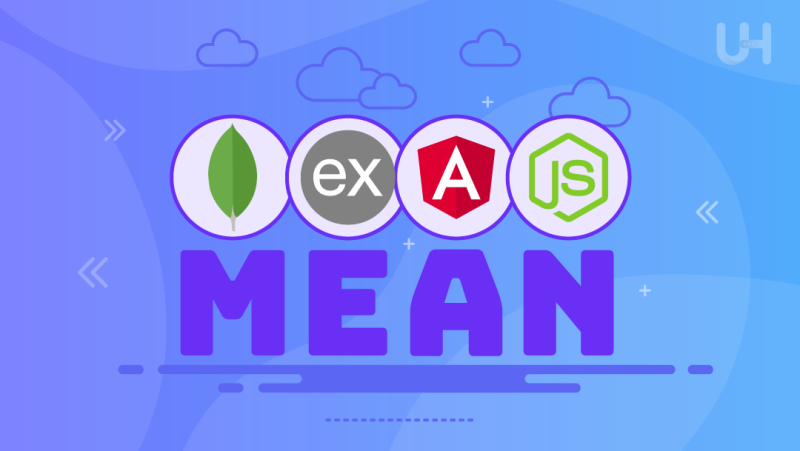The MEAN Stack is a powerful, modern way of web development that mixes MongoDB, Express.js, AngularJS, and Node.js. With such a technology stack, developers can build dynamic websites and applications. This is a JavaScript-based framework; hence, it is mighty, and developers need to learn only one programming language to apply it throughout the whole development life cycle. The MEAN Stack has emerged as popular because of its ability to facilitate and boost the development process in a zippy and efficient manner.
In this guide, we’ll look at what precisely the MEAN Stack is, what it is composed of, and why it is preferred by most web developers.
What is MEAN Stack?
The MEAN Stack stands for MongoDB, Express.js, AngularJS, and Node.js. Each plays a different role in the MEAN stack development of web projects. MongoDB is a data storage mechanism referred to as a NoSQL database, while Express.js is a back-end web application framework that operates on top of Node.js and is used to build web applications and APIs. AngularJs is a front-end framework that enables developers to build single-page dynamic applications. Node.js is a JavaScript runtime for building scalable network applications.
Components of MEAN Stack
The MEAN Stack consists of four technologies, all of which are important when cooperating with each other to result in the strong effectiveness and scalability of robust web applications. Each is very important in this whole development process, with some particular importance lying with database management to ensure data is efficiently handled and stored.
MongoDB
MongoDB is a NoSQL kind of database forming the “M” in the MEAN stack. It was developed for the storage of large data sizes and, at the same time, assures high performance and availability with ease of scalability. It is the Next-Generation Data Store; its flexible JSON-like document stores data with fields that vary from document to document, and the structure of its data can be changed over time. This makes MongoDB very appropriate to fit into the MEAN stack for database management, as it resonates with the current dynamic and flexible nature required by modern web applications.
Express.js
ExpressJS, commonly referred to as Express, serves as the back end of the MEAN Stack, supplying the back end in simple terms by dealing with requests from the front end to the database back end. It’s a powerfully purpose-built web application framework for rapid creation of web apps and Application Programming Interface (APIs) using Node.js. Express makes server-side logic and routing easy. Hence, it’s possible to ease the flow between user interfaces and database operations.
AngularJS
AngularJS is the frontend framework for the MEAN Stack. It gives one the opportunity to extend HTML with added attributes, making it much more responsive in web functionality when a user interacts with it. AngularJS allows for creating dynamic single-page applications, where data can be updated constantly on one page without reloading or refreshing the whole page because, its data binding offers an impressively smooth and effective experience to the user interacting with the server backend and the database.
Node.js
Node.js is a JavaScript runtime built on Chrome’s V8 JavaScript engine. It enables the running of JavaScript code on servers. Being event-driven and non-blocking, it can handle multiple connections at a time with ease, qualities shared by other parts of this stack. The MEAN Stack, therefore, plays the role of the backbone through which a user is able to create a scalable server environment. All transactions of data, from client requests to business operations in the database, are adequately managed.
The biggest advantage of using the MEAN Stack is that every one of those components is built upon JavaScript itself. This means developers can write in a single language for both client-side and server-side environments. This integration removes the complexity of managing multiple languages, resulting in an efficient development process and more efficiency.
Discover the Node.js Hosting for MEAN Stack!
Looking for the perfect place to host your Node.js projects? Choose Ultahost and experience unparalleled performance, scalability, and dedicated support. Ideal for MEAN Stack applications, Ultahost ensures your development environment is optimized for success.
Why Choose the MEAN Stack for Development?
A developer using the MEAN Stack for web development can gain many benefits, which makes it the perfect fit for developing modern web applications. First, there is the advantage of uniformity since one can use only one programming language, JavaScript, across the board over the life of any project. Also, this greatly minimizes the learning curve and increases the speed at which development is carried out, with rich libraries at users’ disposal through Node.js’s Node Package Manager.
The MEAN Stack, with an architecture built on modularity, increases maintainability and sufficiency. It permits easy setup upgrades and scaling, supported by a community that ensures technology security. MongoDB handles data effectively, while Node.js performs asynchronous activities seamlessly. This combination is ideal for managing increased loads at any time.
What works for the MEAN Stack is that it axies one of the factors: cost efficiency. It is an open-source suite of technologies; licensing fee expenses are declined, hence cutting the general costs of overall projects. Also, with a vast repository of free tools and libraries, development and maintenance costs are further reduced. AngularJS can create very user-friendly single-page applications that are pretty dynamic and almost seem like desktop applications. The best implementation of the responsiveness and interaction features of the stack will probably be seen in developing user-centric applications.
Selecting the Right Hosting for MEAN Stack Applications

Find the best hosting solutions for MEAN Stack applications in Managed VPS, Dedicated Servers, and Storage VPS Hosting with world-class performance, scalability, and data management features.
Managed VPS Hosting for MEAN Stack
Managed VPS hosting offers the right solution for developers who wish to focus on application development without going through server-management overheads. Also, this service includes maintenance of operating systems, security patches, and backup at regular intervals. The MEAN Stack is designed for developers who prefer not to manage server complexities. Managed VPS offers a convenient and effective hosting solution for such applications. Generally, there is a pool of knowledge among support teams dealing with Managed VPS who understand JavaScript and its frameworks.
Dedicated Server Hosting for Performance
Dedicated server hosting means dedicating a complete physical server for a single client, hence full control and MEAN Stack applications. This hosting type is ideal for websites or applications with very high traffic. Also, it is suitable for very intricate and requires an immense amount of computation work and other resources. These ensure the developer’s optimal performance because they do not share the servers with the other clients. Now, developers have more assured hands handling the application’s demands, especially at peak traffic times.
Storage VPS Hosting for Data-Intensive Applications
Storage VPS Hosting is designed for applications dealing with huge bulks of resources, such as big data analysis, hosting media, and other uses. Also, it is intended for MEAN stack applications that interact with vast databases and large volumes of data and storage. This hosting is useful for applications storing large volumes of unstructured data, commonly managed with MongoDB. Also, it is the database component of the MEAN stack.
Conclusion
The MEAN stack is a JavaScript framework that enhances web application efficiency and scalability. It integrates MongoDB, Express.js, AngularJS, and Node.js into a unified solution. This approach allows developers to work swiftly using one language across both server and client. This monolithic approach presents simple experiences for coders and gives application performances that can’t be paralleled. Anything from small projects to enterprise-level applications can be designed as MEAN Stack applications. Robust hosting solutions like Dedicated Servers will be able to extract more out of MEAN Stack Applications.
Ready to elevate your MEAN Stack project? Choose Ultahost for web hosting solutions designed for developers. Experience unparalleled performance and reliability with Ultahost today and take your application to the next level!
FAQ
What is MEAN Stack?
MEAN Stack combines MongoDB, Express.js, AngularJS, and Node.js for full-stack JavaScript development.
Why do you think MEAN Stack should be used to develop web applications?
It streamlines development with a single language across all components, making things more efficient.
Can enterprise-level applications be built with MEAN Stack?
Yes, it is very appropriate for large-based applications because of its scalability and robustness.
How can the performance of a MEAN Stack app be improved?
Opt for the best hosting possible, such as a Dedicated Server, and use effective coding techniques.
How is MEAN Stack versatile for developers?
It supports various application types, from e-commerce to social networks.








